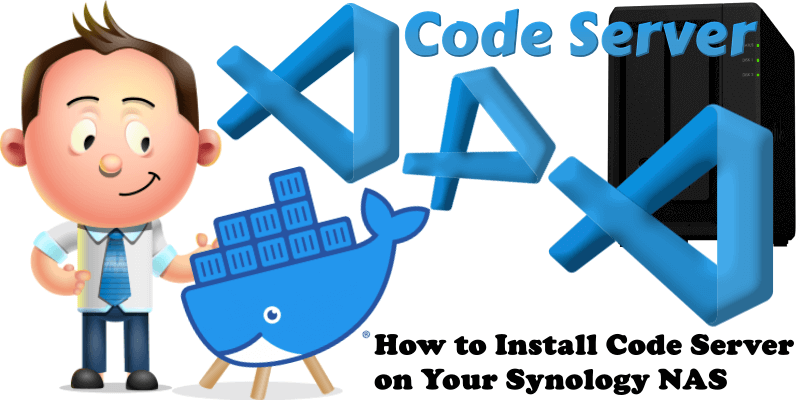
Code-server is VS Code running on a remote server, accessible through the browser. You can code on your Chromebook, tablet, and laptop with a consistent dev environment using Code Server. You can take advantage of large cloud servers to speed up tests, compilations, downloads, and more. Code Server helps you preserve battery life when you’re on the go. All intensive computation runs on your NAS server; you’re no longer running excess instances of Chrome. In this step by step guide I will show you how to install Code Server on your Synology NAS using Docker.
This guide works perfectly with the latest Code Server v4.109.2 release.
STEP 1
Please Support My work by Making a Donation.
STEP 2
Install Container Manager via Synology “Package Center”. If you run an older DSM version (under 7.2), search for Docker instead of Container Manager.
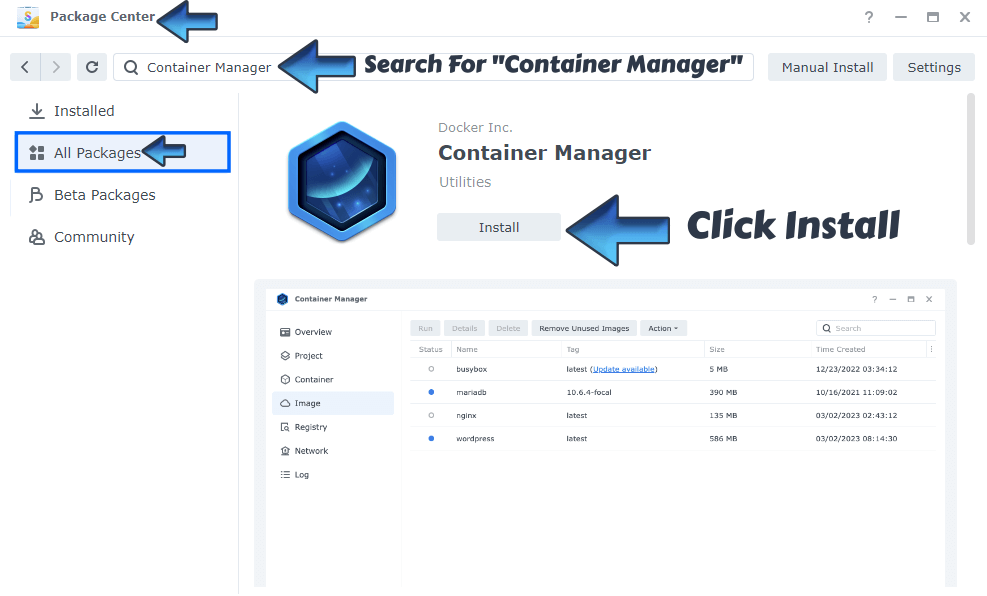
STEP 3
Make sure you have a synology.me Wildcard Certificate. Follow my guide to get a Wildcard Certificate. If you already have a synology.me Wildcard certificate, skip this STEP.
STEP 4
Go to Control Panel / Login Portal / Advanced Tab / click Reverse Proxy. Follow the instructions in the image below.
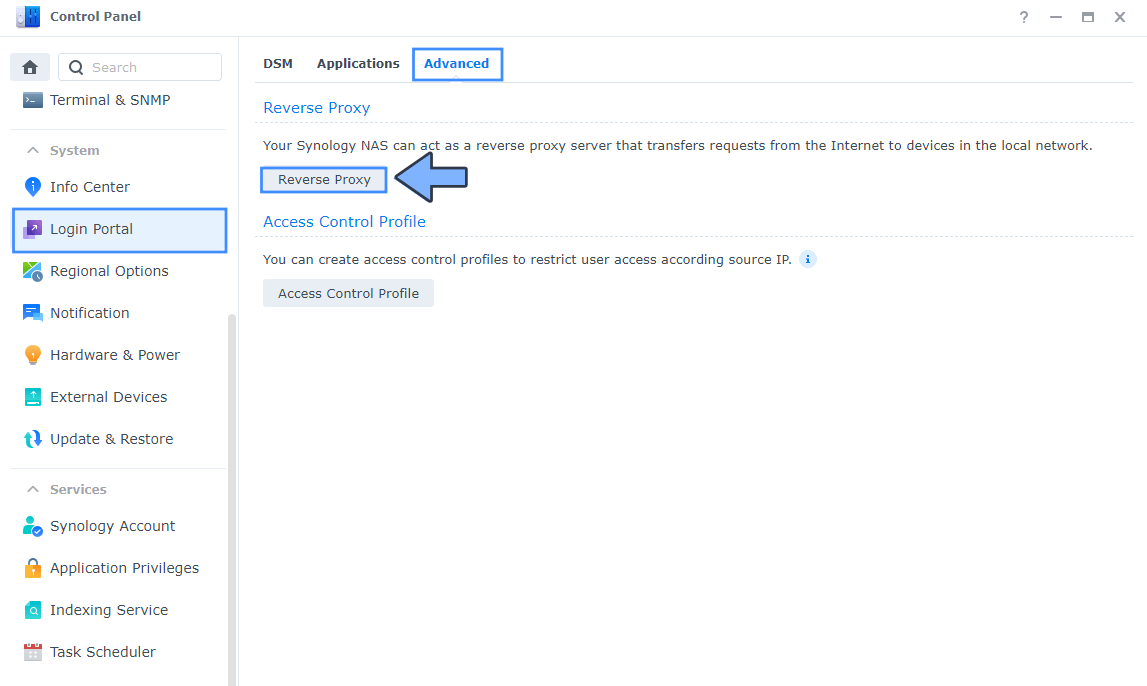
STEP 5
Now click the “Create” button. Follow the instructions in the image below.
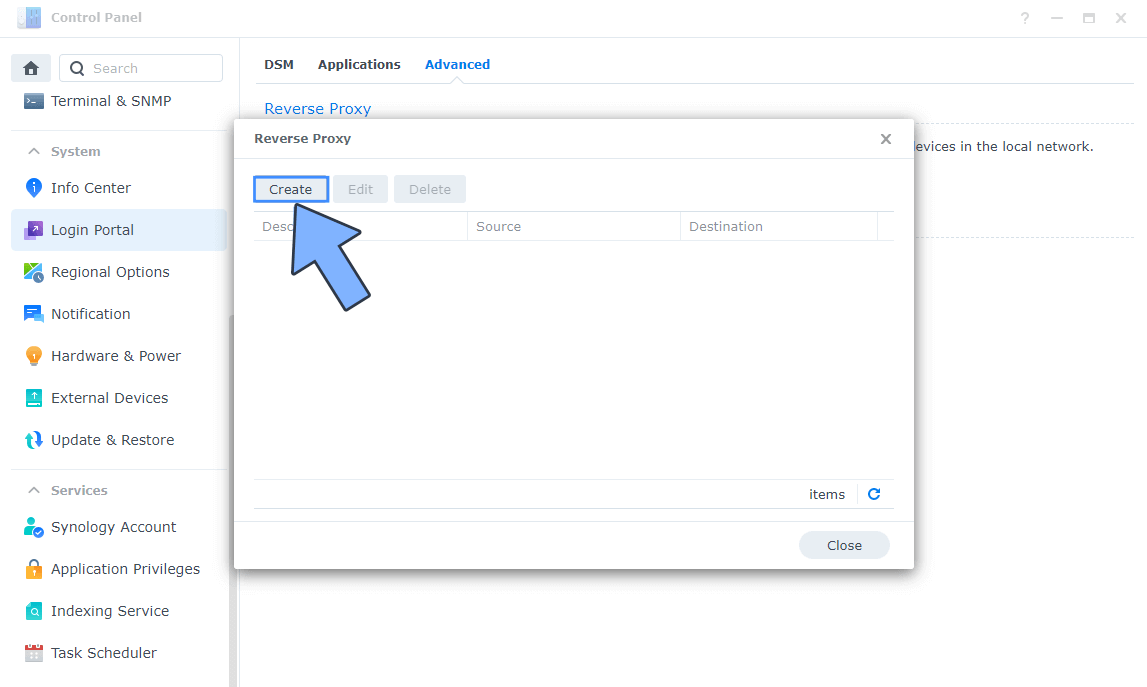
STEP 6
After you click the Create button, the window below will open. Follow the instructions in the image below.
On the General area, set the Reverse Proxy Name description: type in Code Server. After that, add the following instructions:
Source:
Protocol: HTTPS
Hostname: codeserver.yourname.synology.me
Port: 443
Check Enable HSTS
Destination:
Protocol: HTTP
Hostname: localhost
Port: 8377
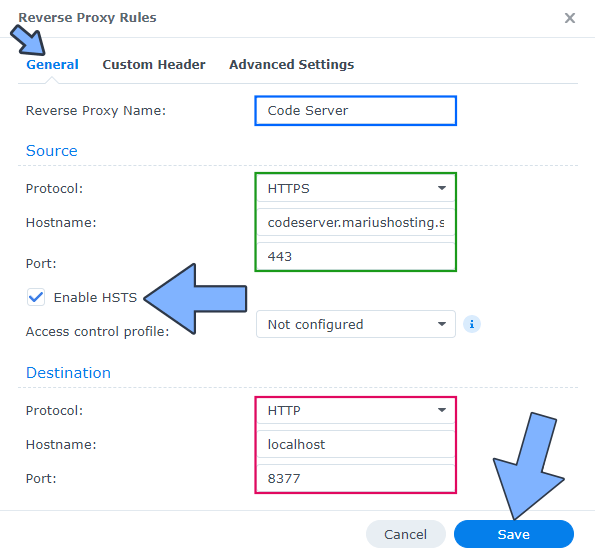
STEP 7
Go to Control Panel / Login Portal / select your Code Server Reverse Proxy then click the Custom Header tab. Click Create and then, from the drop-down menu, click on WebSocket. After you click on WebSocket, two Header Names and two Values will be automatically added. Click Save. Follow the instructions in the image below.

STEP 8
Go to Control Panel / Network / Connectivity / Check Enable HTTP/2 then click Apply. Follow the instructions in the image below.
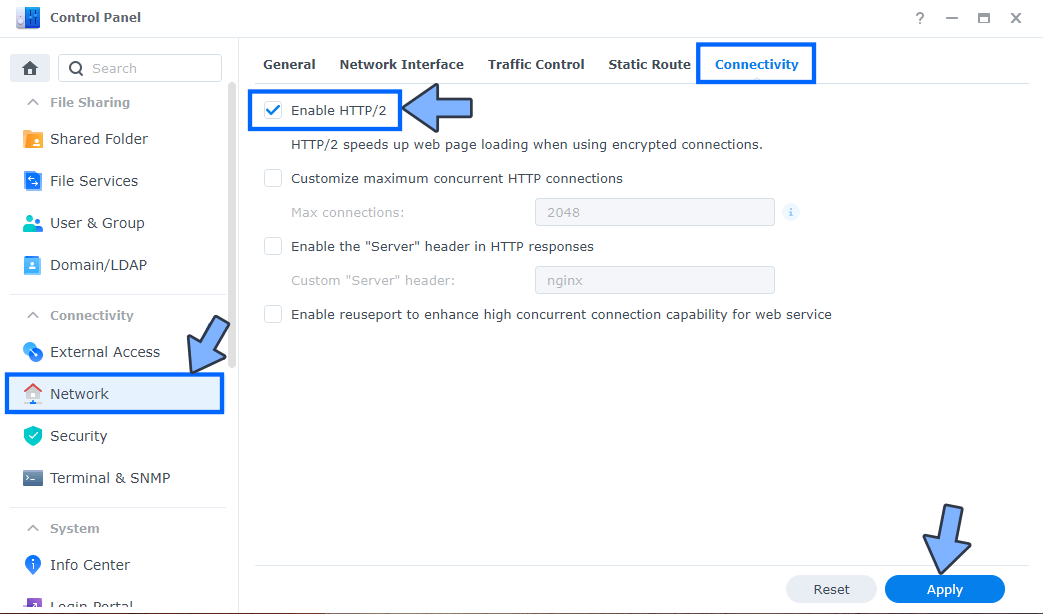
STEP 9
Go to Control Panel / Security / Advanced tab/ Check Enable HTTP Compression then click Apply. Follow the instructions in the image below.
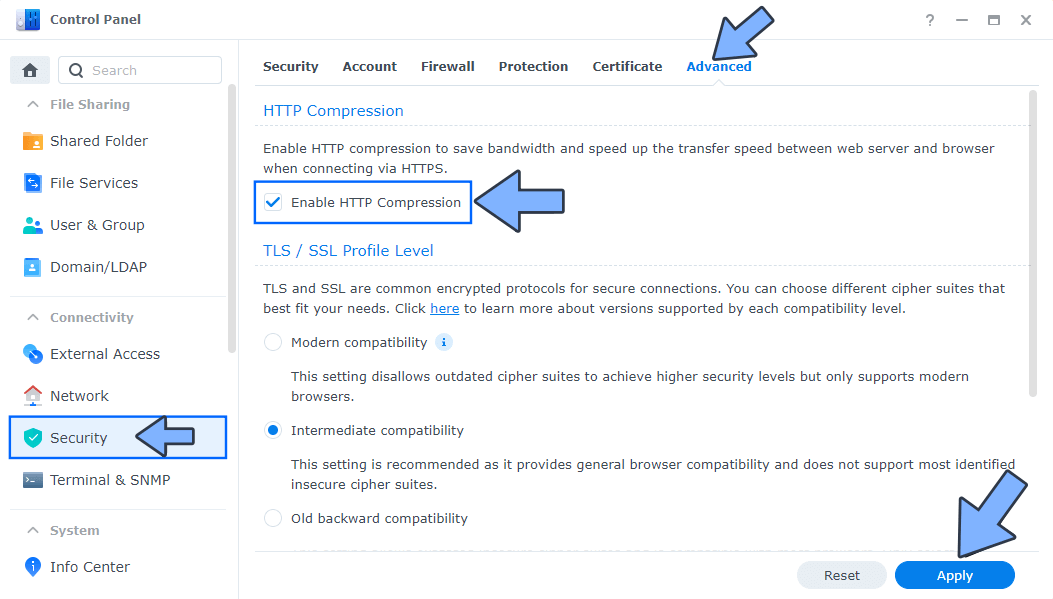
STEP 10
Go to File Station and open the docker folder. Inside the docker folder, create one new folders and name it codeserver. Follow the instructions in the image below.
Note: Be careful to enter only lowercase, not uppercase letters.
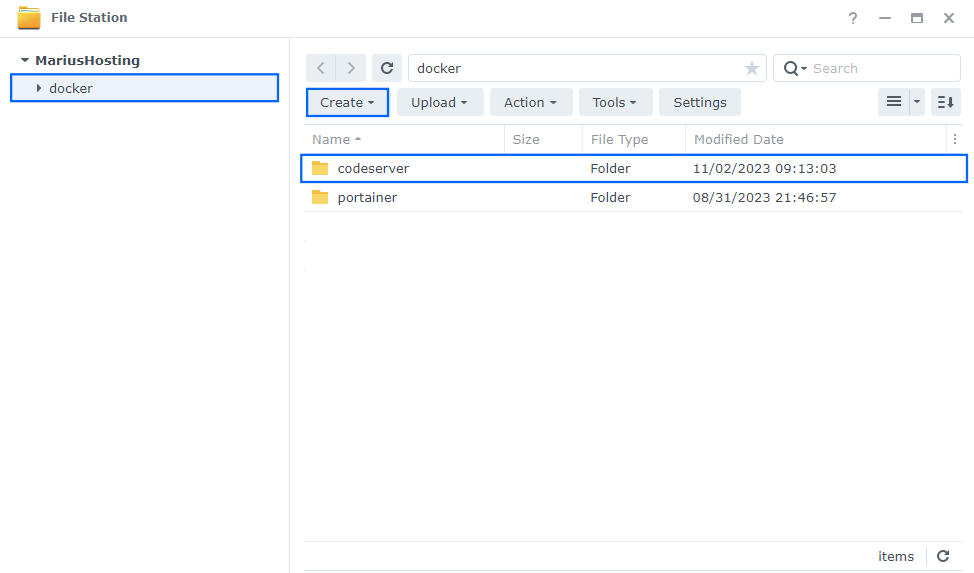
STEP 11
Go to Control Panel / Task Scheduler / Create / Scheduled Task / User-defined script. Follow the instructions in the images below.
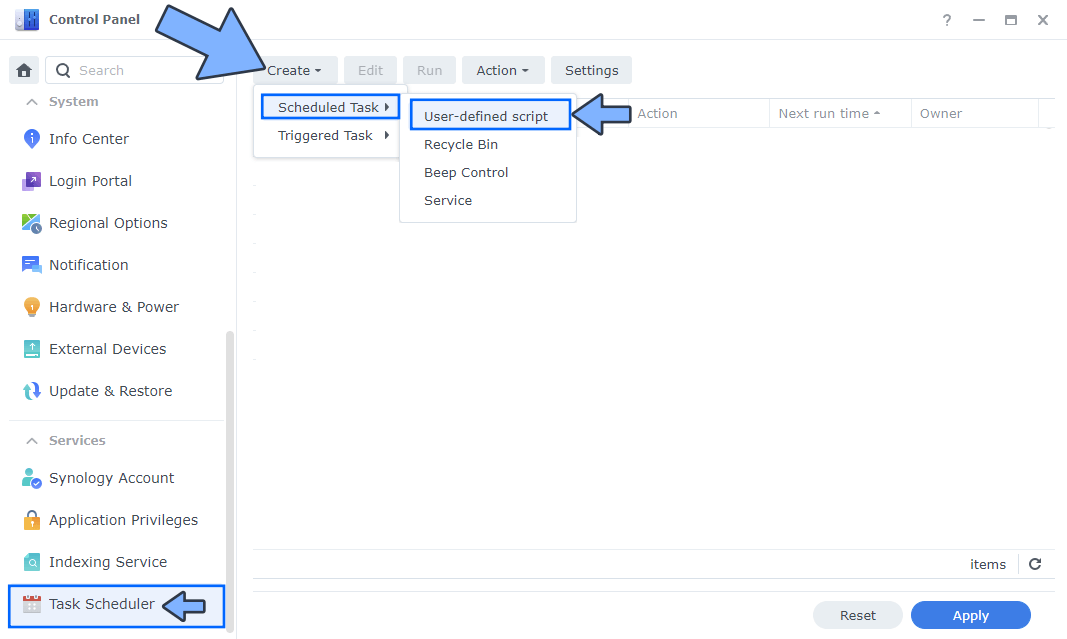
STEP 12
Once you click on User-defined script a new window will open. Follow the instructions below:
- General: In the Task field type in Install Code Server. Uncheck the “Enabled” option. Select root User.
- Schedule: Select Run on the following date then select “Do not repeat“.
- Task Settings: Check “Send run details by email“, add your email then copy paste the code below in the Run command area. After that click OK.
docker run -d --name=codeserver \ -p 8377:8443 \ -e PUID=1026 \ -e PGID=100 \ -e TZ=Europe/Bucharest \ -e PASSWORD=mariushosting \ -e PROXY_DOMAIN=codeserver.yourname.synology.me \ -e SUDO_PASSWORD=mariushosting \ -v /volume1/docker/codeserver:/config \ --restart always \ ghcr.io/linuxserver/code-server
Note: Before you paste the code above in the Run command area below, change the value numbers for PUID and PGID with your own values. (Follow my step by step guide on how to do this.)
Note: Before you paste the code above in the Run command area below, change the value for TZ. (Select your current Time Zone from this list).
Note: Before you paste the code above in the Run command area, change the value for PASSWORD and add your own password. mariushosting is an example of a password. You have to insert your own password.
Note: Before you paste the code above in the Run command area, change the value for PROXY_DOMAIN and add your own synology.me DDNS that you have previously created at STEP 7.
Note: Before you paste the code above in the Run command area, change the value for SUDO_PASSWORD and add your own password. mariushosting is an example for a sudo password. You have to insert your own sudo password.
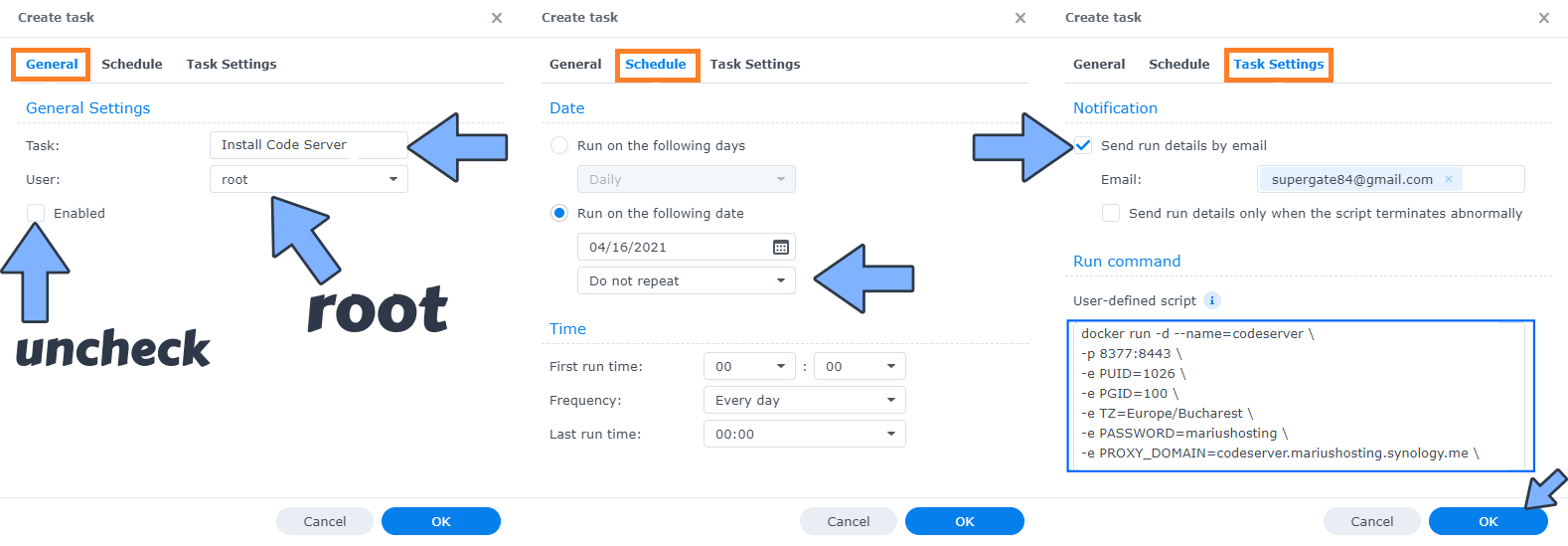
STEP 13
After you click OK on STEP 12 a new warning pop up window will open. Click OK.
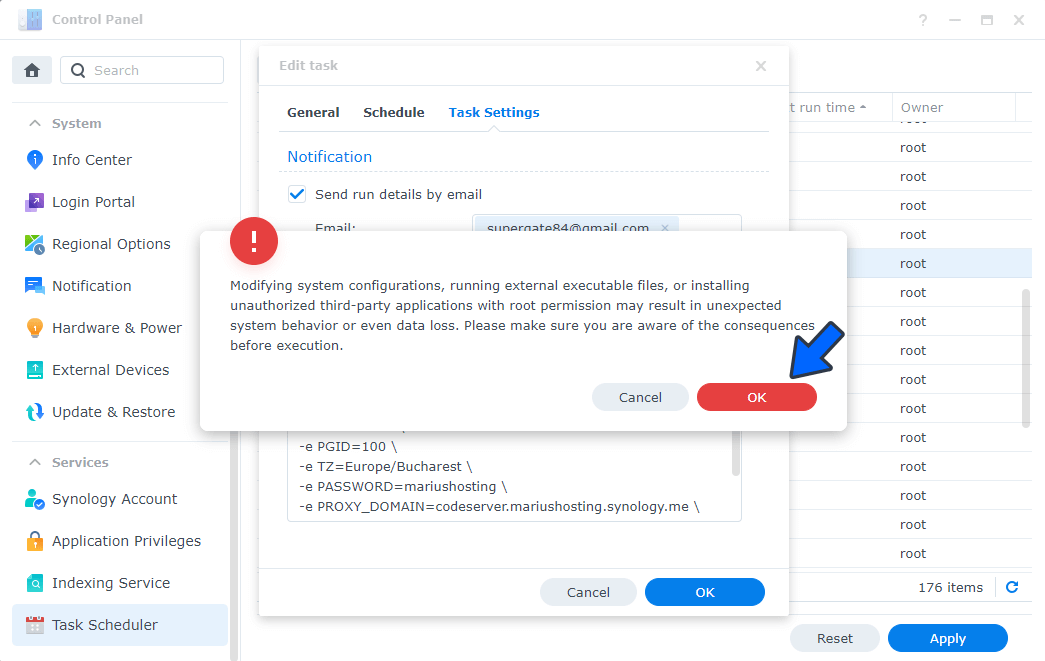
After you click OK, type in your DSM Password then click Submit. Follow the instructions in the image below.
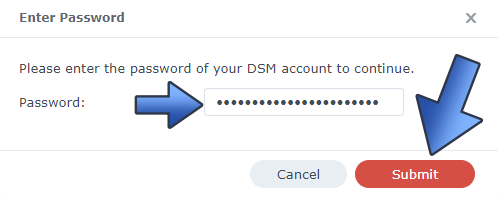
STEP 14
After you click Submit on STEP 13, select your “Install Code Server” Task then click the “Run” tab. You will be asked to run Install Code Server – click OK. Follow the instructions in the image below.
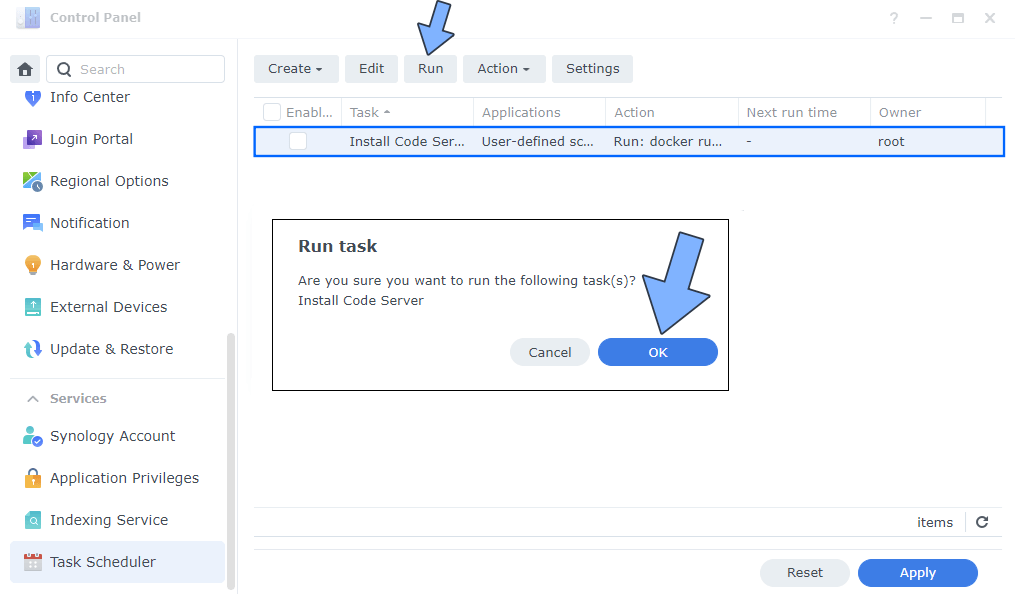
STEP 15
🟢Please Support My work by Making a Donation. Almost 99,9% of the people that install something using my guides forget to support my work, or just ignore STEP 1. I’ve been very honest about this aspect of my work since the beginning: I don’t run any ADS, I don’t require subscriptions, paid or otherwise, I don’t collect IPs, emails, and I don’t have any referral links from Amazon or other merchants. I also don’t have any POP-UPs or COOKIES. I have repeatedly been told over the years how much I have contributed to the community. It’s something I love doing and have been honest about my passion since the beginning. But I also Need The Community to Support me Back to be able to continue doing this work.
STEP 16
Now open your browser and type in your HTTPS/SSL certificate like this https://codeserver.yourname.synology.me In my case it’s https://codeserver.mariushosting.synology.me Type in your own Password that you have previously chosen at STEP 12. Click SUBMIT. Follow the instructions in the image below.
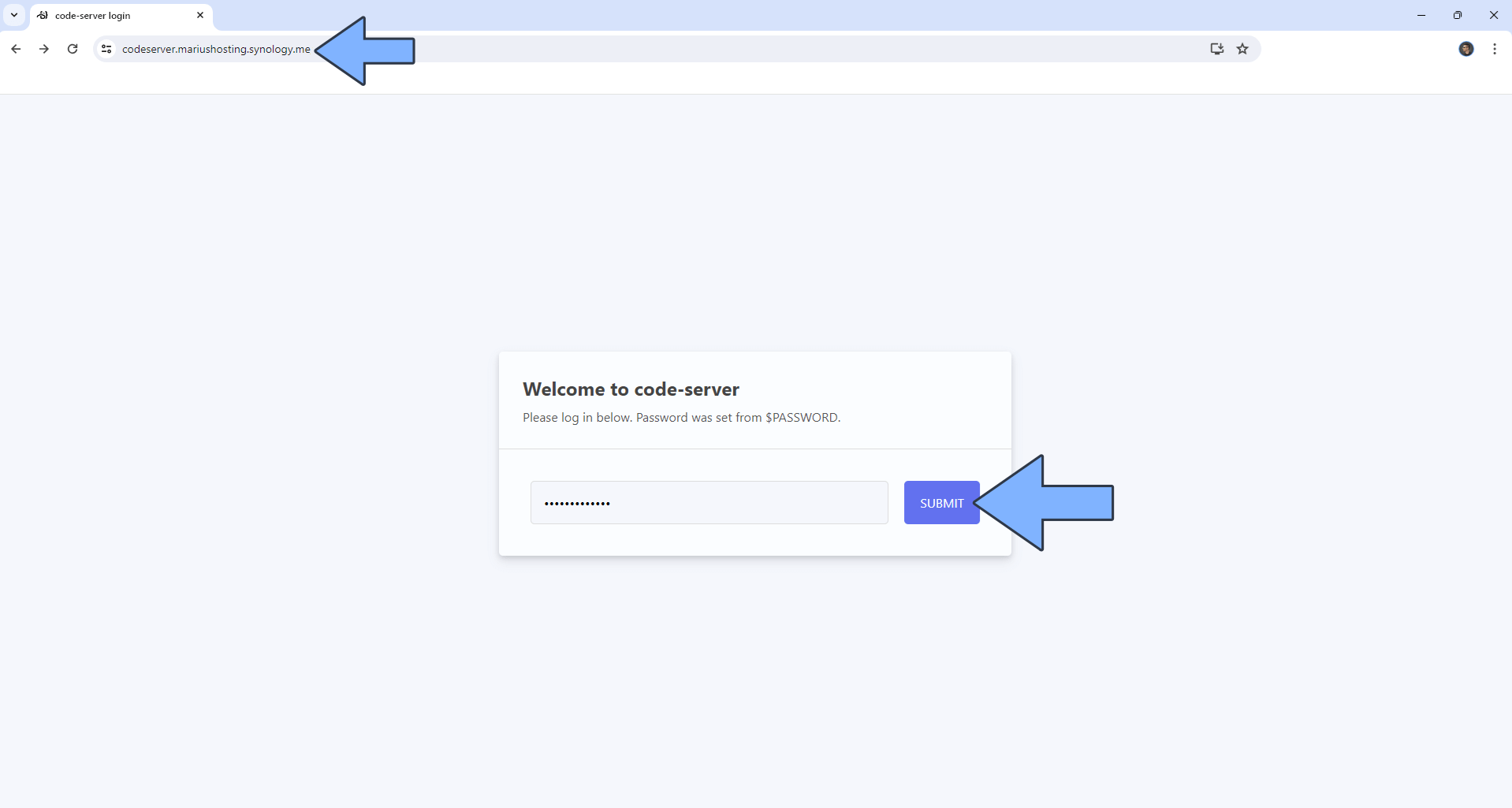
STEP 17
Check “Trust the authors of all files in the parent folder ‘config’“. Click Yes, I trust the authors. Follow the instructions in the image below.
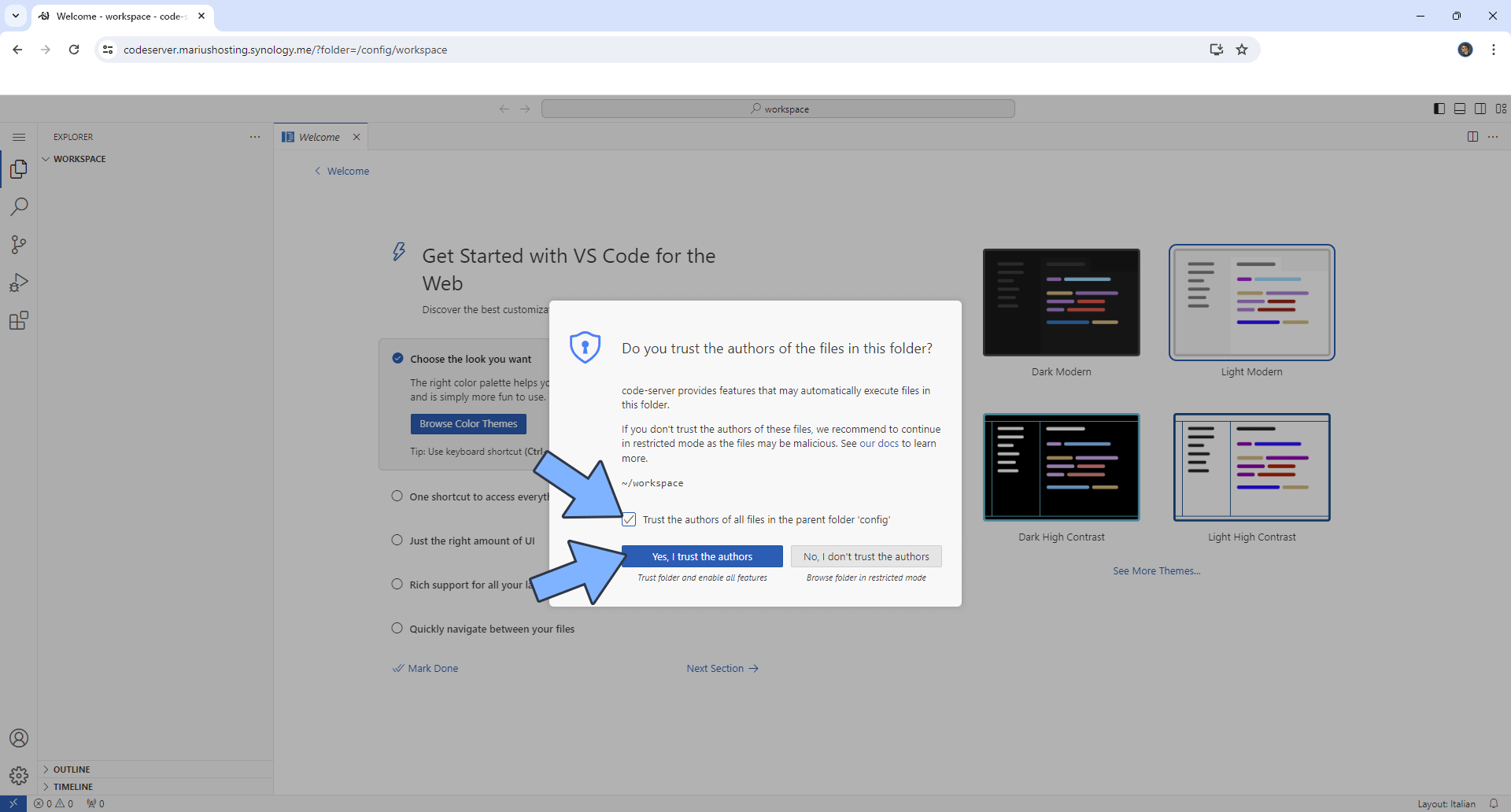
STEP 18
Choose the settings that appeal to you the most, like Dark theme, then click on Next Section.
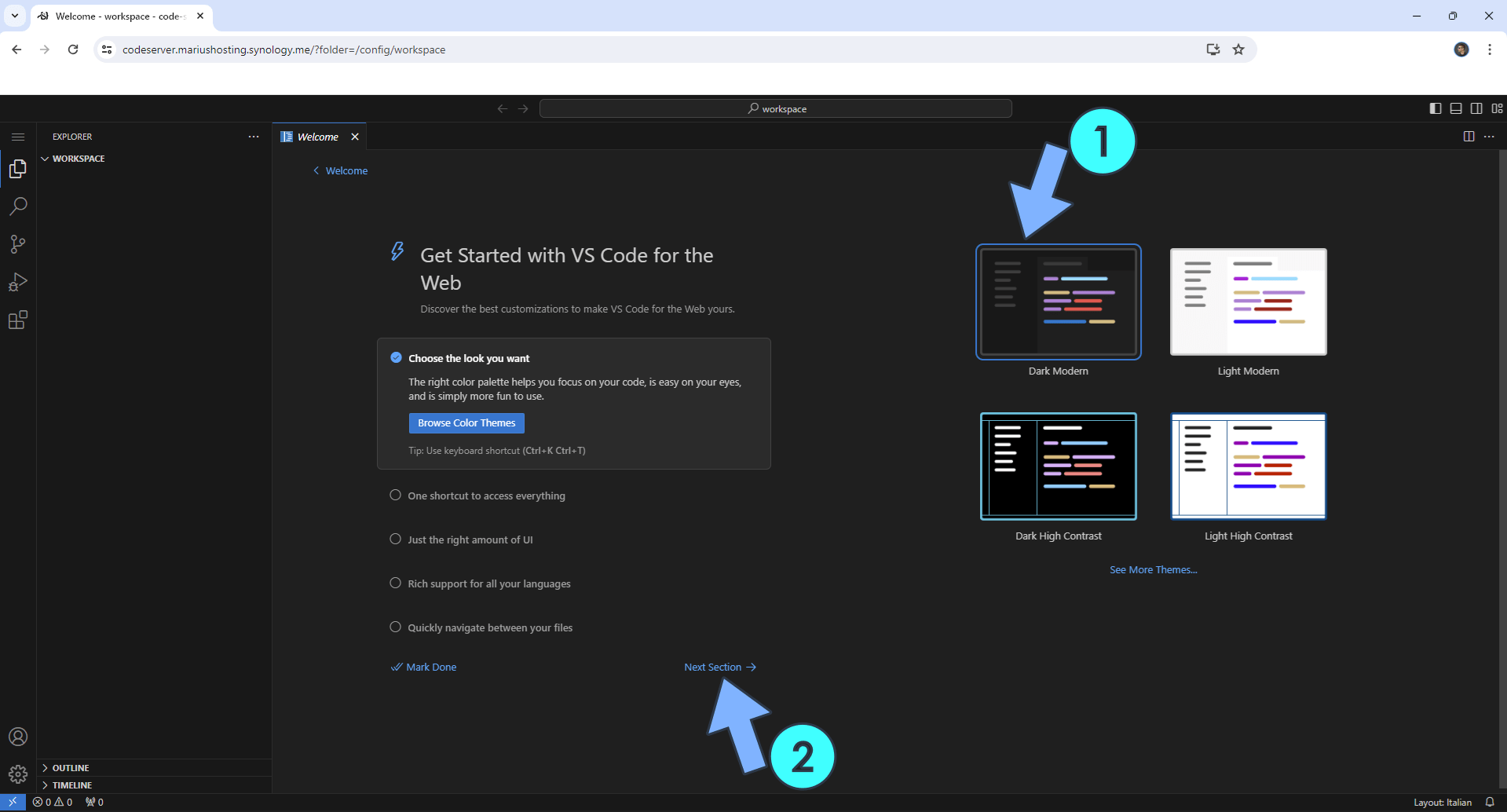
STEP 19
Your Code Server dashboard at a glance!
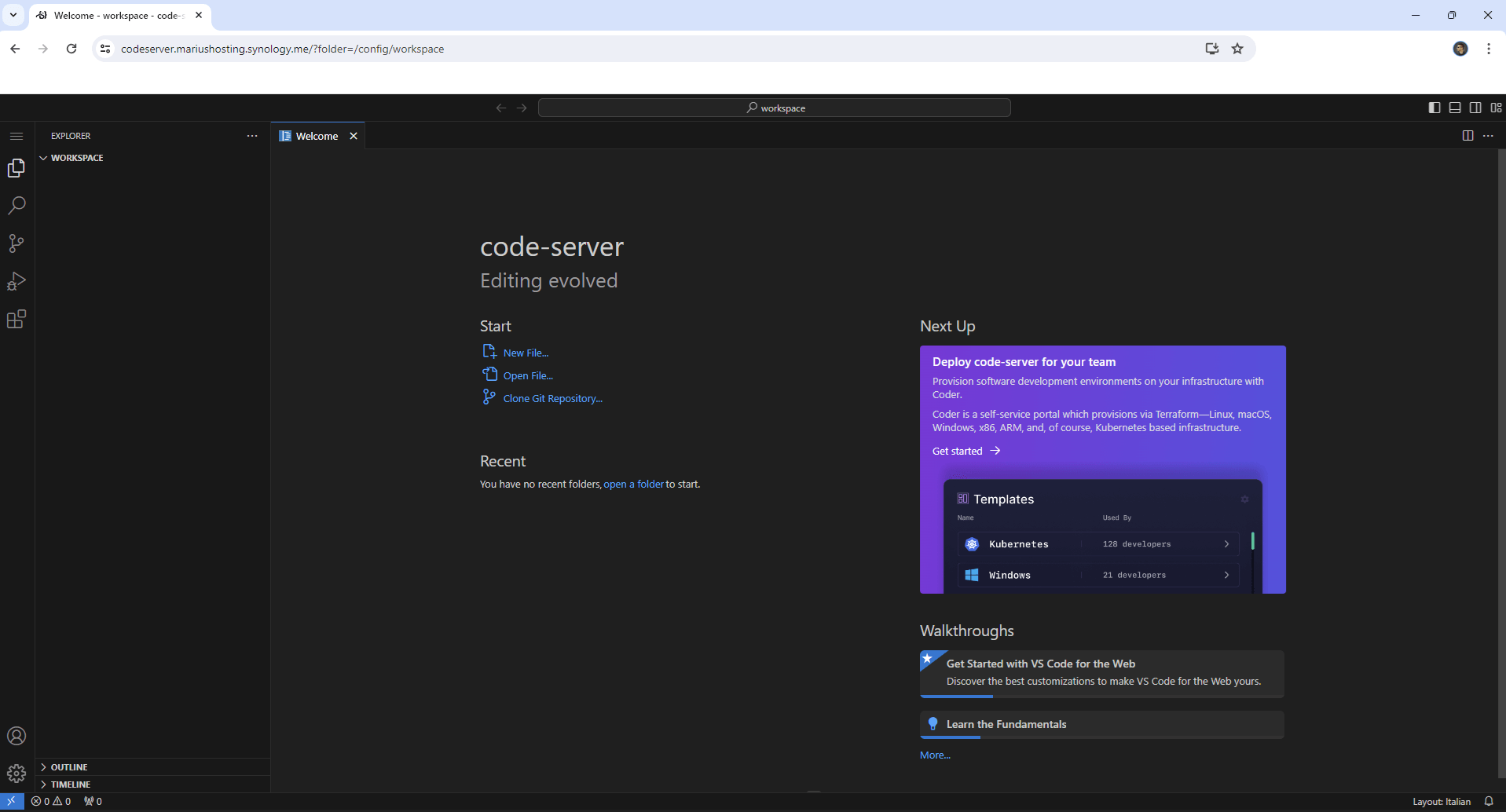
If you encounter issues by using this container, make sure to check out the Common Docker issues article.
Note: Can I run Docker on my Synology NAS? See the supported models.
Note: How to Back Up Docker Containers on your Synology NAS.
Note: Find out how to update the Code Server container with the latest image.
Note: How to Free Disk Space on Your NAS if You Run Docker.
Note: How to Schedule Start & Stop For Docker Containers.
Note: How to Activate Email Notifications.
Note: How to Add Access Control Profile on Your NAS.
Note: How to Change Docker Containers Restart Policy.
Note: How to Use Docker Containers With VPN.
Note: Convert Docker Run Into Docker Compose.
Note: How to Clean Docker.
Note: How to Clean Docker Automatically.
Note: Best Practices When Using Docker and DDNS.
Note: Some Docker Containers Need WebSocket.
Note: Find out the Best NAS Models For Docker.
Note: Activate Gmail SMTP For Docker Containers.
This post was updated on Friday / February 20th, 2026 at 6:48 PM
